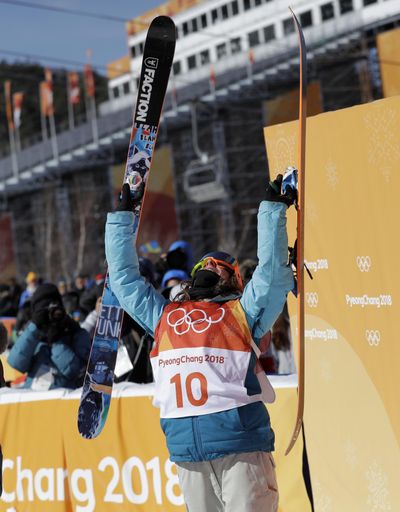Hanna Huskova wins Olympic gold in breezy women’s aerials final

PYEONGCHANG, South Korea – Like every other country and discipline, the aerials team from Belarus puts together a strategy in preparation for the Olympics. What is it? Well, Hanna Huskova says that’s none of your business.
“I am not going to go into it right now,” Huskova said.
Whatever it is, it’s working.
Huskova survived unpredictable and windy Phoenix Snow Park on Friday to give Belarus its second straight gold medal in women’s aerials, edging Zhang Xin of China in an event that turned into a mere battle of survival after four of the six skiers in the final round of elimination either sat down on their landings or wiped out completely.
Belarus has long been a force in the men’s aerials, winning at least one medal in each of the last five Winter Games, with Anton Kushnir in the mix to defend the gold he won in Sochi when the men’s competition starts on Saturday. The women’s program is gaining ground on the guys behind the 25-year-old Huskova and the seemingly ageless Alla Tsuper, who came in fourth in her sixth trip to the Olympics.
“(Alla and I) stood as one and had ambitious goals to see gold, silver and bronze medal go to Belarus,” Huskova said. “It was not to be but nonetheless I am very proud of every one and we did everything we could.”
Huskova and Zhang landed all three of their jumps, enough to claim the top two spots on the podium during a competition when every three-second leap into the South Korean sky was an iffy proposition at best. Huskova’s winning jump, a double-twisting back layout, earned her a score of 96.14, just ahead of Zhang’s 95.52.
“The jumps that I did, I did with calm and with patience,” Huskova said. “I was aiming at the wind today.”
Huskova was the one who did it with the most success. She topped the first round of elimination, was fourth in the second to advance to the final and her third was good enough to extend China’s string of Olympic near misses.
Kong Fanyu took bronze to join teammate Zhang on the medal stand, giving the Chinese seven Olympic medals. The problem is none of them are gold, something they hope to rectify in four years when the games move to Beijing.
“First of all I’m very happy of course because all these years of hard work is paying off but still with regret, really big regret because our initial intention was to get the gold medal,” Zhang said. “So really it’s regretful that we missed it.”
Tsuper, who won gold for Belarus at the 2014 Sochi Games, was fourth in her sixth Olympic appearance. The 38-year-old mother-of-two attempted the most difficult jump of the night, a triple-twisting back flip, but she tumbled forward on the landing and slid face-first down the hill with just one ski attached. Tsuper shrugged off retirement talk, saying she plans to spend time with her family before making any sort of decision about her future.
Laura Peel of Australia was fifth and American rival Madison Olsen was sixth. Olsen’s attempt at giving the U.S. women their first Olympic medal in the event in 20 years ended when her back slid into the hill while landing her final jump.
Gold medal favorite Xu Mengtao of China washed out in the second round and failed to advance to the final.
Winds swirled throughout the competition, starting off from left to right before moving directly into the face of the skiers as they went down the hill at speeds upward of 30 mph. Coaches would hold them for several moments at the top of the hill waiting for the wind to calm down enough to attempt anything close to a “safe” jump.
It’s the second competition at the Snow Park to have wind issues. The women’s snowboard slopestyle final was a mess on Sunday, when only nine of the 50 runs were completed without any significant errors.